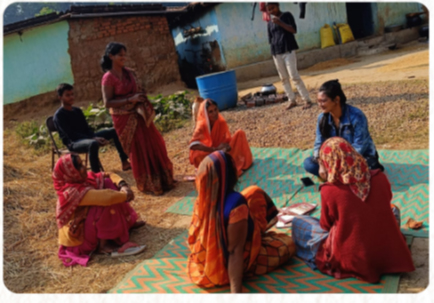
In the chilly December of 2023, I, Kaberi, found myself in the embrace of Gumru, a quaint village, as part of my Gandhi Fellowship Journey. Little did I know that the next 21 days would unfold into a chapter of my life, rewriting my perceptions and connecting me to a world I never imagined! As I stepped into the village unknown and unfamiliar, anxiety gripped me. The village seemed a world away from my comfort zone. My initial purpose was merely to fulfill the fellowship requirements, but the universe had different plans. I found myself caught in a challenging situation when my adoptive family, part of C.I community, requested that I falsify my identity when interacting with other families in the village. The family I lived with belonged to the upper-caste Rajput community, and I was asked to present myself as a fellow Rajput to the rest of the villagers. This request left me feeling a mix of confusion, anger, and sadness. Experiencing this identity crisis brought to life the stories of caste discrimination that I had heard from friends or read about in newspapers. It was surreal to realize that I was personally facing the very issues that seemed distant before. With survival in mind, I reluctantly accepted the situation, recognizing that adapting to these circumstances was a necessary step. This experience made me reflect on the profound impact of identity and the complexities of societal structures, pushing me to consider my role in influencing change from within. During a Focused Group Discussion (FGD), I discovered that a girl, Muskan (the name of the character has been changed), had suddenly stopped going to school. Despite my previous conversations with her where she claimed to be in class 7, I found out that she had lied. When I asked the community, a woman mentioned that Muskan avoids talking about school and becomes quiet when asked. The next day, I tried to casually talk to Muskan to understand the reason behind her school absence. Initially, she avoided the questions, and her body language indicated she was hiding something. However, I persisted in my efforts and, during a walk in the village, she finally opened up. Muskan revealed that she had been severely bullied by some girls at school due to her caste identity.
The humiliation and helplessness she felt led her to decide not to return to school. She had tried to share her ordeal with her class teacher, but no action was taken. In response to Muskan's situation, I visited her school and shared the incident with the teachers. I suggested creating an Anti-Bullying Squad, but the teachers were reluctant, fearing it might cause chaos in the school. Undeterred, I decided to discuss this sensitive issue with the community during the FGD, hoping to find support and address the problem collaboratively. While I may not be certain of the extent to which I influenced the minds of the villagers, I take pride in recognizing the subtle positive changes observed during these discussions. The small shifts in perspectives that I have noticed serve as markers of success for me.
In the end, persuading Muskan to return to her studies felt like a triumph. As I bid farewell, the whispers of my identity as a Bengali girl spread throughout the village, standing out in contrast to the prevalent Rajput community. My departure left behind not just changed perceptions but a newfound acknowledgment of diversity. The awareness of my background lingered, perhaps planting seeds for a broader appreciation of different cultures and backgrounds within the community. And so, with Muskan on her educational journey and the village touched by a subtle shift, my brief time there concluded with a sense of positive change in the air.
TAGS
SHARE





